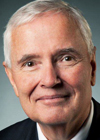On Monday, the Kansas House Education budget committee voted to remove $1 million in FY2016 and FY2017 funding from Wichita State University's National Center of Innovation for Biomaterials in Orthopaedic Research (CIBOR).
Although there are many steps left in the state budget process, WSU President John Bardo and Via Christi Health President and CEO Jeff Korsmo both urged committee members to restore the funding.
CIBOR was founded in 2009 as a joint venture of WSU and Via Christi, the state’s largest health system and a member of Ascension, the nation’s largest Catholic and nonprofit health system. CIBOR is managed by WSU’s National Institute for Aviation Research and it is dedicated to researching and developing the potential of composite materials for use in a wide variety of bioscience and medical applications, including the manufacture of orthopaedic implants.

John Bardo
"We are alarmed at this committee action for two reasons,” Bardo said. “The committee's action doesn't help alleviate the state general fund imbalance because CIBOR funding doesn't come from there. The CIBOR money is from a special tax collected from health businesses for biosciences research and our partner, Via Christi Health, is the largest payor into the system.
“Secondly, the research being performed at CIBOR is at a critical stage and holds great promise for diversification of the Kansas economy through the development of innovative medical devices,” Bardo added.
Korsmo agreed: “This funding cut will not help solve the state's budget problems. It will hurt important research that could help Kansans and people around the world – and the Kansas economy.
“This funding loss would have a negative impact on the progress we have made in developing the next generation of medical devices that have the potential to significantly improve quality of life for the estimated 1 million Americans a year who need orthopaedic surgery,” Korsmo said.
“We have reached a critical point in the development of these medical advances. This research requires continued state funding if we are to be successful in translating it to the commercial world. It would be tragic to remove funding from a project that has the potential to benefit patients around the globe, and the Kansas economy," Korsmo said.
CIBOR has been successful in several areas of orthopaedic device development, with several patent submissions in the area of bone void fillers, spine restoration devices and novel surgical instruments. CIBOR has attracted and completed several contracts for major orthopaedic manufacturers, and has made discoveries that will influence a range of orthopaedic devices, from hip and knee implant design to MRI safety.
Notably, CIBOR received funding from the U.S. Department of Defense and is developing a battlefield stabilization device for the military.
"We urge the Committee members to reconsider their actions and restore this funding since it will have no impact on the budget issues facing Kansas and will impact economic diversification so badly needed in our region of the state," Bardo said.
About Via Christi Health
Sponsored by Ascension, Via Christi Health (www.viachristi.org) is the largest provider of health care services in Kansas. Via Christi employs approximately 10,000 in its hospitals, senior villages, physician offices and health services.
Ascension (www.ascension.org) is a faith-based health care organization dedicated to transformation through innovation across the continuum of care. As the largest nonprofit health system in the U.S. and the world’s largest Catholic health system, Ascension is committed to delivering person-centered care to all with special attention to those who are poor and vulnerable. In FY2014, Ascension provided $1.8 billion in care of persons living in poverty and other community benefit programs. More than 150,000 associates and 35,000 affiliated providers serve in 1,900 sites of care – including 131 hospitals and more than 30 senior care facilities – in 23 states and the District of Columbia. In addition to health care delivery, Ascension subsidiaries provide a variety of services and solutions including physician practice management, venture capital investing, treasury management, biomedical engineering, clinical care management, information services, risk management, and contracting through Ascension’s own group purchasing organization.

